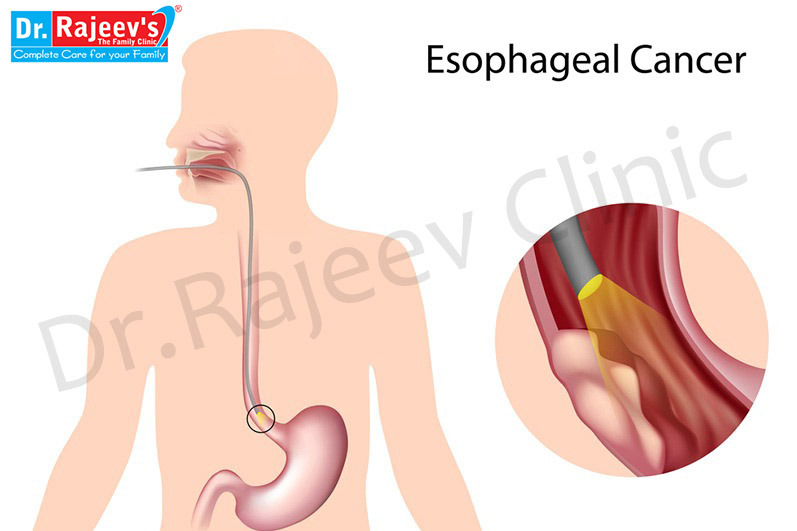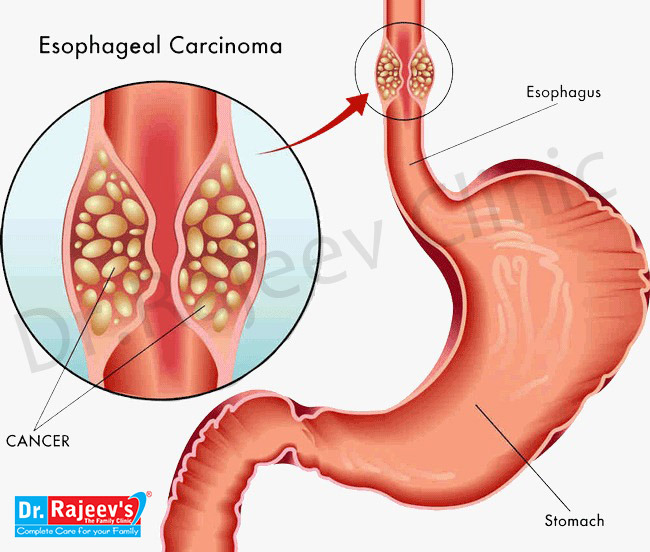Esophageal cancer is cancer that occurs in the esophagus — a long, hollow tube that runs from throat to stomach. esophagus helps move the food swallow from the back of throat to stomach to be digested.
Esophageal cancer usually begins in the cells that line the inside of the esophagus. Esophageal cancer can occur anywhere along the esophagus. More men than women get esophageal cancer.
Esophageal cancer is the sixth most common cause of cancer deaths worldwide. Incidence rates vary within different geographic locations. In some regions, higher rates of esophageal cancer may be attributed to tobacco and alcohol use or particular nutritional habits and obesity.
The stages of oesophageal cancer are based on “The American Joint Committee on Cancer’s (AJCC) TNM system”, a commonly accepted method based on three key components:
- Tumor (T):- describes the size of the original tumor.
- Node (N):- indicates whether the cancer is present in the lymph nodes.
- Metastasis (M):- refers to whether cancer has spread to other parts of the body.
Once the T, N and M scores have been assigned, an overall stage is assigned.
- Stage 0:- Stage 0 oesophageal cancer is also called as “carcinoma in situ” and is confined to the inner layer of epithelial cells lining the oesophagus.
- Stage I: – In Stage 1, oesophageal cancer tumor is small i.e. (7 cm or less across) and limited to the oesophagus. Cancers have spread into the connective tissue layer below theepithelium but have not invaded the underlying muscle layer.
- Stage II: – In Stage II, oesophageal cancer tumor has grown larger but still remains within the oesophagus. In this stage, there is no evidence of spread to lymph nodes or distant sites.Cancers either have spread through the muscle layer to the outer boundaries of the oesophagus or have spread only into the muscle layer but have reached nearby lymph nodes.
- Stage III: – In Stage III, oesophageal cancer tumor has grown beyond the oesophagus and may now extend into nearby tissues or organs but it may or may not have spread to nearby lymph nodes.
- Stage IV: – In stage IV, tumor may be any size and has grown beyond the oesophagus. In this stage, cancers have metastasized, or spread, to distant organs such as the stomach,liver, bone, or brain.
Symptoms of Esophageal Cancer
Signs and symptoms of esophageal cancer include:
- Difficulty swallowing (dysphagia)
- Weight loss without trying
- Chest pain, pressure or burning
- Worsening indigestion or heartburn
- Coughing or hoarseness
Early esophageal cancer typically causes no signs or symptoms.
Causes of Esophageal Cancer
It's not exactly clear what causes esophageal cancer.
Esophageal cancer occurs when cells in the esophagus develop changes (mutations) in their DNA. The changes make cells grow and divide out of control. The accumulating abnormal cells form a tumor in the esophagus that can grow to invade nearby structures and spread to other parts of the body.
Types of Esophageal Cancer
Esophageal cancer is classified according to the type of cells that are involved. The type of esophageal cancer you have helps determine treatment options. Types of esophageal cancer include:
- Adenocarcinoma. Adenocarcinoma begins in the cells of mucus-secreting glands in the esophagus. Adenocarcinoma occurs most often in the lower portion of the esophagus. Adenocarcinoma is the most common form of esophageal cancer in the United States, and it affects primarily white men.
- Squamous cell carcinoma. The squamous cells are flat, thin cells that line the surface of the esophagus. Squamous cell carcinoma occurs most often in the upper and middle portions of the esophagus. Squamous cell carcinoma is the most prevalent esophageal cancer worldwide.
- Other rare types. Some rare forms of esophageal cancer include small cell carcinoma, sarcoma, lymphoma, melanoma and choriocarcinoma.
Risk factors
It's thought that chronic irritation of esophagus may contribute to the changes that cause esophageal cancer. Factors that cause irritation in the cells of esophagus and increase risk of esophageal cancer include:
- Having gastroesophageal reflux disease (GERD)
- Smoking
- Having precancerous changes in the cells of the esophagus (Barrett's esophagus)
- Being obese
- Drinking alcohol
- Having bile reflux
- Having difficulty swallowing because of an esophageal sphincter that won't relax (achalasia)
- Having a steady habit of drinking very hot liquids
- Not eating enough fruits and vegetables
- Undergoing radiation treatment to the chest or upper abdomen
Complications
As esophageal cancer advances, it can cause complications, such as:
- Obstruction of the esophagus. Cancer may make it difficult for food and liquid to pass through esophagus.
- Pain. Advanced esophageal cancer can cause pain.
- Bleeding in the esophagus. Esophageal cancer can cause bleeding. Though bleeding is usually gradual, it can be sudden and severe at times.
Prevention
- Quit smoking.
- Drink alcohol in moderation, if at all.
- Eat more fruits and vegetables.
- Maintain a healthy weight.
Homeopathic Treatment of Esophageal Cancer
Homeopathy is one of the most popular holistic systems of medicine. The selection of remedy is based upon the theory of individualization and symptoms similarity by using holistic approach. This is the only way through which a state of complete health can be regained by removing all the sign and symptoms from which the patient is suffering. The aim of homeopathy is not only to treat cancer of esophagus symptoms but to address its underlying cause and individual susceptibility. As far as therapeutic medication is concerned, several remedies are available to treat cancer of esophagus symptoms that can be selected on the basis of cause, sensations and modalities of the complaints.
Homeopathic Medicine of Esophageal Cancer
Arsenic Album, Rhus Tox, Causticum, Gelsemium, Phosphorous,
Nitric Acid, Mercurius, Alumina, Merc Cor, Secale Cor, Sulphuric Acid,
Alumina, Calcaria Carb, Hydrastis, Sepia, Lachesis, Carbolic Acid, Silicea,
Ignatia, Natrum Mur, Kali Carb, Plumbum Met, Lycopodium and many other medicines.
Or As Directed by Physician



